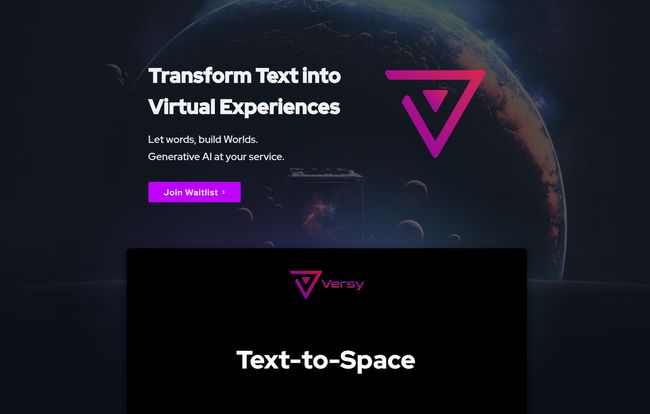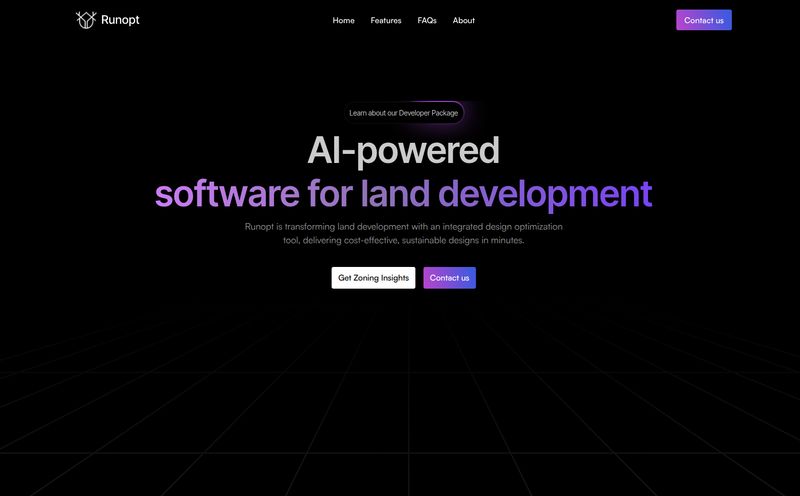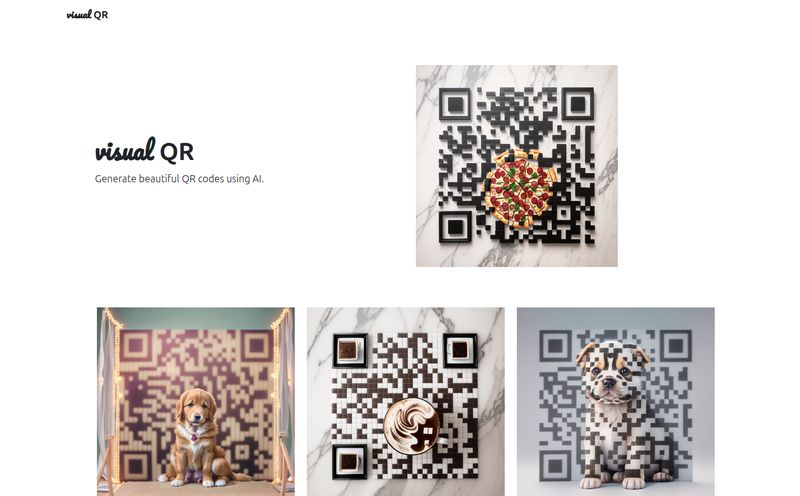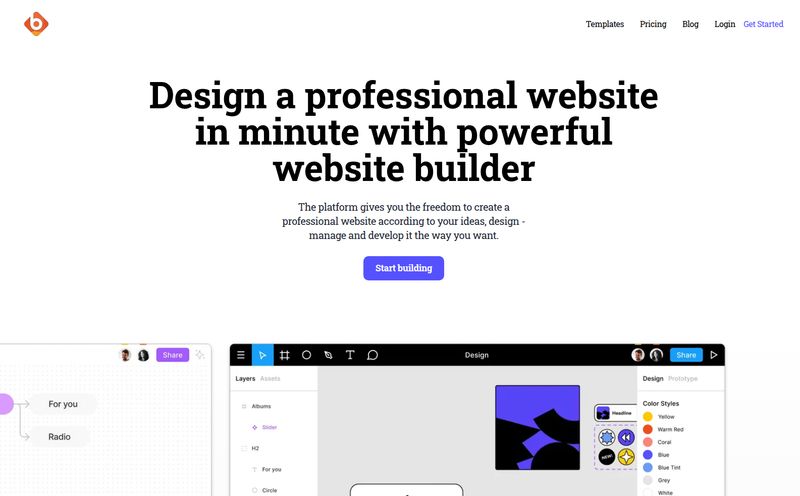I’ve been around the SEO and digital marketing block a few times. I remember the Second Life hype, the QR code craze that never quite took off as promised, and I definitely remember the great ‘metaverse’ gold rush of 2021. Everyone was scrambling to buy digital land and build clunky, often empty, virtual headquarters. It felt like a solution in search of a problem.
But then, Generative AI crashed the party. And suddenly, things got interesting.
We've all seen what AI can do with text and images. Now, a new platform called Versy.ai is making a bold claim: “Let words, build Worlds.” It's a big promise. A huge one, actually. The idea that you can just type a description and manifest a fully interactive, data-driven virtual experience feels like something ripped from a Neal Stephenson novel. So, as someone who lives and breathes traffic, trends, and tech, I had to take a closer look. Is this just more metaverse hype, or is it a genuinely useful tool for businesses?
So What Exactly is Versy.ai?
At its core, Versy.ai is a “Text-to-Space” platform. You feed it prompts, and it generates virtual environments. But here’s where my curiosity was really piqued—it’s not just about creating a pretty 3D room. That’s been done. The website explicitly says it’s for creating “interactive experiences of gamification, configuration and events, to escape rooms, leaderboards, treasure hunts and more.”

Visit Versy.ai
This isn't just a 3D modeler. This is an experience engine. Think of it less like a digital sculptor carving a statue, and more like a Dungeons & Dragons Game Master who can conjure a quest, a monster, and a treasure chest based on what the players (or in this case, your customers and your data) are doing. It aims to be the bridge between a simple idea and a scalable, interactive world, without needing a full team of Unity developers on standby.
The Key Features That Caught My Eye
Alright, let's get into the weeds. A slick landing page is one thing, but the features are what determine if a tool has legs. A few things on Versy's site stood out to me as more than just marketing fluff.
The Magic of Text-to-Space Prototyping
The headline feature is, of course, generating spaces from text. As a marketer, the word “prototype” immediately jumped out at me. The ability to quickly iterate on ideas is invaluable. Imagine being able to mock up three different virtual event concepts in an afternoon just by typing descriptions. “Create a futuristic neon-lit trade show booth with our logo on the back wall and three interactive product displays.” Then, “Okay, now make it a rustic, outdoor festival theme with game stations.” That speed is something traditional 3D development workflows can only dream of.
A Data-Driven Experience Isn't Just a Buzzword Here
This is the part that I think is being seriously undersold. Versy.ai claims you can connect to your own data to “dynamically build your experience.” This is the holy grail for creating practical, useful virtual spaces. For example, an e-commerce brand could create a virtual showroom where the items on the shelves are populated in real-time from their Shopify inventory API. A product is out of stock? It vanishes from the virtual shelf. A new line drops? It appears instantly. This turns a static, boring 3D room into a living, breathing extension of your business operations.
Customization and Scaling Your Digital Universe
One of my biggest gripes with early AI tools was the generic output. Everything looked… the same. Versy seems to address this by allowing you to train the AI on your business needs and create branded experiences. This suggests a deeper level of control. And then there's the scalability. The platform is designed to build and maintain multiple interconnected virtual experiences. This isn’t about a one-off campaign. It’s about building a persistent brand universe where users can move from your virtual store to a training module to a gamified event. That’s a powerful concept for customer retention and lifetime value.
The Good, The Bad, and The AI-Generated
No tool is perfect, especially one this ambitious. Based on what they're presenting, here’s my honest take.
On the upside, the cost-effectiveness is a massive selling point. I've seen quotes for custom VR experiences that would make your eyes water. By automating much of the creation process, Versy could democratize access to this tech. The data integration, as I mentioned, is a potential game-changer. It elevates these spaces from digital dioramas to functional business tools.
However, let’s be realistic. The platform’s success hinges entirely on the quality of its AI. If the “Text-to-Space” generator produces clunky, weird-looking environments, the whole thing falls apart. There's also going to be a learning curve. The promise of “just type” is alluring, but I suspect that to get truly great, customized results, you'll need to learn the art of prompt engineering and how to properly “train” the AI to your brand. It’s not magic; its a new kind of work.
Who Is This Really For? Finding the Right Fit
I can see a few key groups getting really excited about this.
- Marketing Agencies: The ability to quickly prototype and deploy immersive campaigns for clients without a huge overhead? That’s a license to print money.
- E-commerce Brands: Product configurators are a proven way to increase conversions. Imagine a car buyer not just choosing colors on a webpage, but walking around their custom-configured car in a virtual garage.
- Human Resources & Training: Forget boring slideshows. Onboarding new employees with an interactive treasure hunt through a virtual office, or running team-building escape rooms? Yes, please.
- Education: Building interactive historical sites or scientific models from text prompts could revolutionize how students learn.
The All-Important Question of Pricing
So, how much does it cost to start building your own universe? Well, that’s the million-dollar question. Currently, there is no public pricing for Versy.ai. The site funnels you towards a “Join Waitlist” button. This tells me a few things. First, they are likely in an early-access or beta phase, carefully selecting their first users. Second, they're probably targeting enterprise clients or agencies first, rather than individual hobbyists.
In my digging for this piece, the direct link for pricing info actually led me to a 404 error page. And that’s not a criticism! It's an authentic sign of a platform in its early, formative stages. They're focused on the tech first, which I can respect. So for now, the cost of admission is just your email address.
My Final Thoughts: Is Versy AI Worth Joining the Waitlist?
I started this with a healthy dose of skepticism, born from years of watching tech trends come and go. But I’m ending it with genuine curiosity and a bit of excitement. Versy.ai seems to understand the most important thing: the 'metaverse' is not about creating a second life, it's about creating better, more engaging tools for this life.
If they can deliver on the promise of interactive, data-driven experiences that are easy to generate and scale, this could be a seriously powerful platform. It moves the conversation from “let’s build a 3D model” to “let’s build a functional, gamified customer experience.” For any marketer, brand manager, or business owner looking to get ahead of the next wave of digital interaction without breaking the bank, joining the waitlist seems like a no-brainer. The risk is zero, and the potential to be an early adopter of a transformative technology is incredibly high. I’ve signed up. We’ll see what worlds we can build.
Frequently Asked Questions about Versy.ai
- What makes Versy.ai different from other 3D world builders?
- The main difference is the focus on interactivity and data. While others help you build static 3D environments, Versy.ai is designed to create dynamic experiences like escape rooms, product configurators, and games that can change based on real-time data from your business.
- Is Versy.ai easy to use for non-developers?
- The “Text-to-Space” feature is designed to be user-friendly, but there will likely be a learning curve. To get highly specific and branded results, users will probably need to learn how to write effective prompts and train the AI, which is a skill in itself.
- Can I use Versy.ai for my e-commerce store?
- Absolutely. This seems to be a prime use case. You could create interactive product configurators or entire virtual showrooms connected to your live inventory, offering a unique and functional shopping experience.
- How much does Versy.ai cost?
- Currently, there is no public pricing available. The platform is operating on a waitlist model, suggesting it's in an early stage of release. You have to sign up to get more information on access and potential costs.
- What kind of data can I connect to Versy.ai?
- The platform advertises a “Data Driven UX,” which implies it can connect to various data sources, most likely through APIs. This could include e-commerce platforms (like Shopify), inventory management systems, CRMs, or other business databases.
- Is this part of the 'metaverse'?
- In a way, yes. But it's a more practical and business-focused application of the concept. Instead of a massive, shared social world, Versy.ai helps you build bespoke, brand-owned virtual spaces that serve a specific function, like marketing, sales, or training.
Reference and Sources
- Versy.ai Official Website
- Forbes: The Role Of Generative AI In The Metaverse
- Neil Patel: How Generative AI Is Going to Change Marketing Forever



